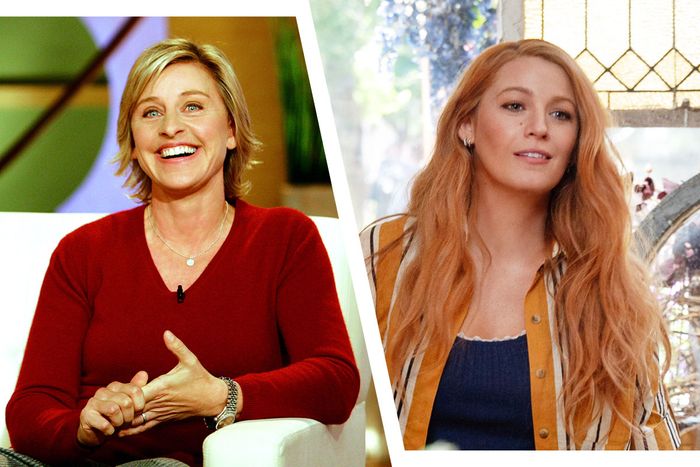
Colleen Hoover’s 2016 best seller It Ends With Us features some undeniably distracting details, particularly for a book about something as serious as domestic violence. There’s someone named Ryle (not a typo). The made-up term “floral shop” is thrown around constantly. And the main character goes through a phase where she’s strangely obsessed with Ellen DeGeneres. While Justin Baldoni and Blake Lively’s new big-screen adaptation wisely cuts back on that narrative device, the now-disgraced daytime talk-show host is still referenced three times in flashbacks. If you’re a casual viewer, you’d be reasonably baffled, but there is an explanation — sort of.
Early in the novel, readers learn that Lily Blossom Bloom, the irritatingly named aspiring florist played onscreen by Lively, was too embarrassed to keep a traditional diary as a teen and so wrote all of her thoughts and secrets to Ellen DeGeneres. The diary entries, as they appear in the novel, all begin with the salutation “Dear Ellen.” Lily references things in the letters that happen on The Ellen DeGeneres Show, and gets “mad” when reruns air in place of new episodes. She suggests things she thinks might be funny to include on the show and evangelizes the wonders of DeGeneres as a concept to a young man named Atlas, who’s squatting in the house next door to hers. When Lily loses her virginity to Atlas, she writes about it to — you guessed it — DeGeneres, as so many teen girls do. The references are relentless in the book, and it’s enough to challenge your grip on reality every time you see the words “Dear Ellen.”
The movie — directed by Baldoni, who also stars as Ryle — dispenses with this concept for the most part but still allows room for a few DeGeneres sightings. As a younger Lily, played by newcomer Isabela Ferrer, gets ready for school, we glimpse a diary entry that begins with “Dear Ellen,” and there’s a huge Finding Nemo poster prominently displayed in her room. Most conspicuously, when Lily offers to let unhoused Atlas (Colony’s Alex Neustaedter) take a hot shower and steal some of her dad’s clothes, she also makes popcorn and invites him to watch The Ellen DeGeneres Show. The references are, to be fair, fleeting, and they’re likely just meant to be little Easter eggs for fans of Hoover’s book.
But if you’re looking for an answer as to why Lily Blossom Bloom shares her deepest, darkest secrets with a celebrity who voiced a forgetful animated fish, there isn’t one in either the book or the movie. She just … likes her. An irresponsible armchair diagnosis of this Ellen fixation could point to the fact that, as a young woman, Lily routinely watched her father Andrew (Kevin McKidd) physically abuse her mother Jenny (Amy Morton). Maybe teenage Lily is just disassociating because her home life is, to put it lightly, traumatic. A cheerful celebrity whose brand centered around kindness and humor might’ve been a way for Lily to cope. (Again: This book was released in 2016, years before it was revealed that DeGeneres maybe isn’t so nice after all.)
It Ends With Us wants to be a lot of things on both page and screen. It wants to be a heart-wrenching tale about a “perfect” relationship that takes a dark turn and a story of female empowerment, but it also wants us to bask in the overwhelming romance of Ryle and Lily’s initial courtship, and it doesn’t build Lily’s character enough to pull off any empowering. At least it’s not also a movie where audiences have to hear “Dear Ellen” read aloud constantly in voice-over.

